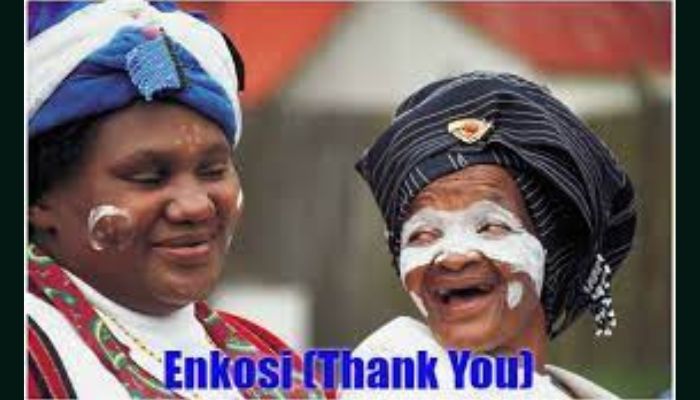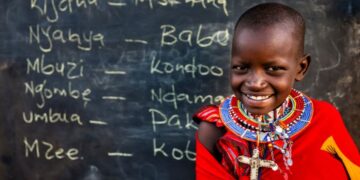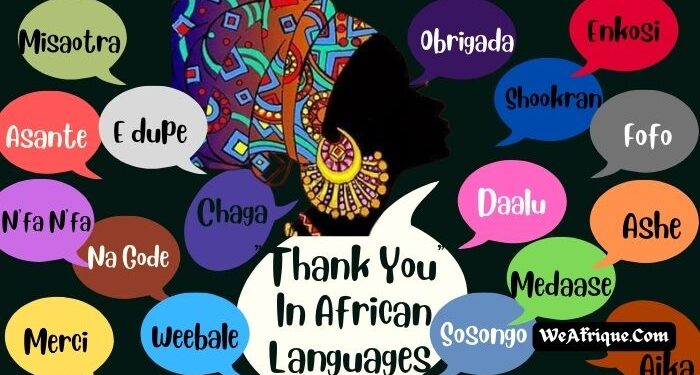Language is one of the most integral aspects of human life and without doubt one of the most beautiful phenomena in and around the world. Expressing gratitude in one’s dialect, especially in Africa connotes deep meanings than the English man’s words. Saying Thank You in African languages indeed is one way to connect with Africans across several ethnic groups.
It is astonishing to know the extent to which the understanding of a language or otherwise can impact the life of an individual. Your life can be unbelievably stress-free in a new terrain if you have a good understanding of their language and at the same time, be as miserable as a mouse drenched by the rain when you know next to nothing.
Learning a new language can be a daunting task especially if you have passed a certain age but it is also worthy to note that the journey to becoming a great communicator and a multilingual starts with learning the simplest and the basics of any language like saying “Thank You”.
Here are 50+ Ways of Saying Thank You in African Languages
1. Swahili– Asante
With over 150 million speakers, Swahili stands as the most spoken language in Africa. It is the official language of the Tanzanians, Ugandas, Congonisns, and Kenyans, however, countries like Ethiopia, Sudan, Burundi, Rwanda, southern Somalia, northern Mozambique, and the Comoros Islands use this language.
2. Zulu – Ngiyabonga
Being the official language of about 12 million people around the world, Zulu is easily one of the simple languages to learn. It is spoken in South Africa, Swaziland, Botswana, Lesotho, Malawi, and Mozambique.
3. Yoruba – E dupe
If you are visiting west African countries like Nigeria, Benin and Togo then this is one word you should be conversant with. The natives are known to have very respectful and say E dupe even as a form of greeting. Some dialect’s derivatives include Ekiti, Ijebu, Oworo, Ijesha, and Akoko.
4. Hausa – Na Gode
Unsurprisingly, this is one official language that is used in Nigeria and is commonly used for trade. Other neighboring countries like Benin, Burkina Faso, Cameroon, CAR, Chad, Congo, Eritrea, Germany, Ghana, Niger, Sudan, and Togo also use the language.
5. Amharic -አመሰግናለሁ (āmeseginalehu)
Amharic is the official language of Ethiopians and is spoken by over 9 million people. Though often confused with Arabic because it shares the same structure of consonantal roots, its writing pattern is different.
6. French -Merci
This is one of the most common ways French speakers say thank you. Though originally known as a European language, French has found its place in Africa thanks to Colonialism and over 3 million Africans use it every day. It has also become the official language of 11 African countries and the second language for over 10 countries. Some of these countries include; Benin, Burkina Faso, Cameroon, Madagascar, Ivory Coast, and the Republic of Congo.
7. Igbo – Daalụ
Mostly used by the eastern part of Nigeria, Igbo is one of the largest languages in WestAfrica and there are over 18 million speakers. Some Nigerian states which use these languages include; Abia, Anambra, Ebonyi, Enugu, Imo, Delta, and Rivers state.
8. Oromo – Galatoomi
Thank you or rather Galatoomi is one the frequently used word in countries like Ethiopia, Kenya, Somalia, Eritrea, and Djibouti Egypt. It is spoken by over 40 million people which means it is the fourth most spoken language in Africa.
9. Arabic – شكرا لك (Shukran lak)
This is one of the six most spoken languages in the world which means that over 200 million speakers exist. Extending your gratitude in Arabic is a sure way to say “I connect with you”. The language is primarily spoken in countries like Egypt, Algeria, Morocco, Mauritania, Libya, Tunisia, and Eritrea.
10. Portuguese – Obrigada
This remains the simplest way of saying thank you in Portuguese even though it’s gender-related. This means that Obrigado is used by men while obrigada is used by a female. Though derived from the Latin word Obligare, African countries like Angola, Mozambique, Guinea-Bissau, Cape Verde, São Tomé and Príncipe, and Equatorial Guinea use Portuguese as their official language. They were the formal colonies of the Portuguese Empire and are mostly known as Lusophone Africa.
11. Shona – Ndatenda, Wazviita
If you find yourself in a country with Shona speakers, then you are in for a thank you ride. The people are characterized by their hospitability. One way to really appreciate them is to say Ndatenda at least. Countries that speak Shona include South Africa,
12. Xhosa – Enkosi

The speakers of Xhosa say thank you in two ways. It’s either Ndiyabulela or Enkosi. However, most foreigners prefer to say Enkosi which is short and very simple to pronounce. The language is used in over 10 African countries including South Africa, Lesotho, and Botswana.
13. Afrikaans – Dankie
To express your gratitude to the Afrikaner people, you can simply say Dankie. Asides from South Africa, the language is spoken by over 6 million people across Africa and Asia. It is also known to be a Dutch-derived language.
14. Zabarma – Fofo
Fofo you would agree is the simplest way of saying thank you to natives of Zarrma who are found in western Niger. Other countries with minor speakers include Nigeria, Benin, Burkina Faso, Ivory Coast, Ghana, Togo, and Sudan.
15. Somali – Mahadsanid
This language is spoken mainly in Somalia by over 8 million people. Other countries that use the language are Djibouti, Ethiopia, Yemen, and Kenya which gives a total of over 12 million speakers around the world.
16. Tsonga – Ndza Khensa
To show how thankful you are around the native speakers of Tsonga, just say Ndza khensa. This is language is common in South Africa, Mozambique, and Eswatini.
17. Setswana – Kea leboga
You would be doing yourself a great favor to know how to say thank you in Setswana. This is the National language of Botswana and one of the eleven official languages in South Africa sometimes called Tswana.
18. Berber – Shookran
If you are planning a trip to Morocco, then you would need to keep the word Shookran in your pocket. From the airport to the hotel, malls, and schools all you would keep hearing is Shookran which means simply means ‘Thank You’. Berber is spoken by over 10 million people from countries like Algeria and Libya, Tunisia, northern Mali, northern Burkina Faso, Mauritania, and the Siwa Oasis of Egypt.
19. Fulani – A’ Jaraama
Commonly known as a Senegambian language, Fulani is spoken by at least 60 million people across over 20 countries including; Nigeria, Mali, Guinea, Senegal, and Niger. Following this population, the word ‘Thank You’ can be translated as Miyotti, Useko, and A’ Jarama depending on the natives.
20. Sesotho – Ke a leboga
The simplest form of courtesy used by the Basotho people of Lesotho is Ke a Leboga which means ‘Thank You. It is one of the official languages in South Africa and Zimbabwe.
21. Kinyarwanda – Murakoze Urakoze
This language is the mother tongue of over 23 million people around the globe. It is spoken in countries like Rwanda, Burundi, the Democratic Republic of the Congo, Uganda, and Tanzania.
22. Akan – Medaase
Akan speakers say Medaase which means ‘Thank You’ as a means of appreciation. It is mainly spoken by over 80% of Ghanaians however, it also spreads across countries like Côte d’Ivoire and Togo.
23. Lingala – Melesi
‘Melesi Ma’am’, ‘Malesi Sir’ is one of the ways Congolese express gratitude. Lingala is spoken by over 30 million people around the world including in neighboring states like Northwestern Angola, eastern Gabon, southern Central African Republic, and southwestern Sudan.
24. Tigrinya – Yegeniyeley
Saying thank you in one’s native language connotes deep meaning and a sense of connection. Tigrinya is one of Eritrea’s official languages and it is also used by the northern settlers of Ethiopia.
25. Chichewa – Zimomo
To express your gratitude in Chichewa, all you need to say is ‘Zimomo’. This language is the official language of Malawi. It is also used across countries like; Zambia, Mozambique, and Zimbabwe.
26. Chaga – Aika
The natives of Chaga or settlers of northern Tanzania and south of Mount Kilimanjaro speak a language known as Chaga which is also called Kichaga, Kichagga. It is spoken by over
27. Kirundi – Urakoze
Urakoze typically means thank you in Kirundi which is widely spoken by over 5 million people across Burundi, Rwanda, Uganda, Tanzania, and the Democratic Republic of Congo.
28. Nyanja – Zikhomo
Save yourself the stress of saying Thank You to the people of Malawi and Zambia. You should say Zikhomo instead. Nyanja is the official language of Malawians and Zambians. It is also spoken in minor parts of Mozambique, Zimbabwe, and South Africa.
29. Wolof – Djerdjef
For a country like Senegal where Wolof is the official language, you would agree that the word Djerdjef which means Thank You is very common. It is spoken by over 7.8 million people in Africa.
30. Malagasy – Misaotra
This is an Austronesian language known to be the first language of Madagascar. Malagasy speakers are about 25 million people.
31. Umbundu – Ndapandula
Thank you is translated as Ndapandula or Twapandula in Umbundu. The former serves as the singular while the former is the plural form. Umbundu is a Bantu language that is mainly spoken by the Ovimbundu tribe of Angola.
32. Kinyarwanda – Urakoze
The above means Thank You in the Kinyarwanda language which is spoken by over 12 million people. It is also one of the four major languages of Rwanda.
33. Maasai – Ashe
Ashe is not to be confused with Eshe which also connotes gratitude by the Yorubas. The Maasai language also known as Maa is mostly spoken by Southern Kenya and Northern Tanzania natives of Maasai.
Read Also: African Sex Ritual – 9 Shocking Sexual Practices In Different African Tribes
34. Luganda -Weebale
On your next visit to Uganda, use the word Weebale rather than Thank You. The settlers of this region get overwhelmed when foreigners relate to them in Luganda. This language is spoken by the Baganda people of Uganda.
35. Kanuri – Nyiro askǝrngǝna
This is a Chadic language that is mostly spoken in countries like Chad, Nigeria, Niger, and Cameroon. Other countries like Libya and Sudan also have minor speakers.
36. Bambara – A ni che
Though Bambara isn’t the official language of any country, it has spread across several countries like southern Mali, Guinea, Burkina Faso, and Senegal.
37. Venda – Ndolivhuwa
The Above is one of South Africa’s official languages which is primarily spoken by the Venda people in the northern part of South Africa and a minor part of the Lemba people of Zimbabwe.
38. Ibiobo – Sosongo
In the southern part of Nigeria, the word Thank You simply means Sosongo. However, it also means the same for tribes like Efik and Oro. The major speakers of Ibibio are mostly found in Akwa Ibom and the Cross River States. Few settlers around Cameron who are natives of Oron also say Sosongo.
39. Sissala -Nlonlo
‘Thank You’ is translated as Nlonlo by the Sissala people who are a small group in south-central Burkina Faso and are known to be majorly farmers.
40. Kreyol – Mèsi
Though the word Mèsi can be easily interchanged with the french world Merci, these are two different languages even though over 90% of the Kreyol vocabularies are derived from french words. Kreyol Haitian Creole is spoken by 10 – 12 million people across Africa.
41. Changana – Kanimambo
The Changana language is spoken by the Bantu people of Zimbabwe, Mozambique, and South Africa. Changana can also be spelled as Xangana and it is spoken by over 4 million people.
42. Kikuyu – Theguo
Theguo is the simplest way to say ‘Thank You’ by the natives of Kikuyu. This language is mostly spoken by the largest ethnic group in Kenya which makes up over 17% of the entire population.
43. Ewe- Akpe
Togolese and southeastern Ghanaians say Akpe as a means of gratitude. The Ewe language is spoken by over 5 million people in Africa including countries like Ghana, Togo, and Benin.
44. Dogon – Gha-ana
Native speakers of Dogon can be found in the central plateau region of Mali, in West Africa, south of the Niger bend, near the city of Bandiagara, and in Burkina Faso.
45. Swati – Ngiyabonga
If you say Ngiyabonga to natives of Eswatini and South Africa, you are simply saying ‘Thank You’. The language Swati is spoken by over 12 million people across these countries.
46. Bozo – Sabaikor
The Bozo people of the Mande ethnic group understand ‘Thank You’ as Sabaikor. Known majorly for their fishing activities, these people are located along the Niger River of Mali.
47. Moba – N’fa N’fa
This is the major language of the Bimoba people who live in northern Togo, Ghana, and a minor group of Burkina Faso.
48. Dangme – Openo
If you remember the word ‘Open’, you can easily say Openo to express gratitude. The people located in south-eastern Ghana are the major speakers of Dangbe also known as the Kwa language. As of 2004, the language speakers spanned over 800 000.
49. Bassa – M̀ zùo Nì zùo
‘Thank You’ simple means M̀ zùo Nì zùo in the Bassa language which is known to have over 300000 speakers. It is largely spoken by the Bassa people of Cameroon.
50. Tumbuka – Taonga
The speakers of Tumbuka are over 1.5 million. They are located in the northern Region of Malawi and Zambia in the districts of Lundazi, Lumezi, and Chasefu.
51. San- Foo Barka
To express gratitude to the Sans, all you should say is Foo Barka. This language has been used in South Africa for over 2000 years and its regarded as one of the oldest languages in Africa.
52. Dagbani – Ti pagi da
Dagbani is a Gur language spoken by northern Ghanaians who are overseen by the King of Dagbon. Also, Dagbani is taught in several primary and junior schools around the Dagbani kingdom and reportedly has over 3 million native speakers.





















Discussion about this post